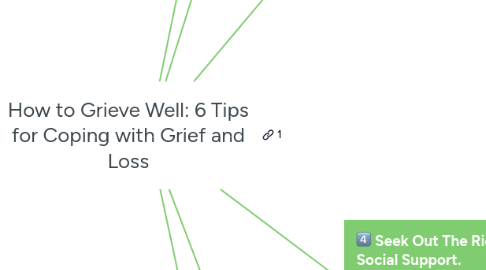
1. Don’t Put Time-limits On Your Grief.
1.1. There’s no way to know how long your grief “should” last.
1.2. Grief does lessen with time, but how quickly and to what extent is difficult to predict.
1.3. Don't think that just because you’ve gone through a grieving process you will no longer feel sadness or regret when you’re reminded of it.
1.4. Grief is about learning to accept and manage our sadness around loss, not to eliminate it.
2. Resist Comparing Your Grief to Other People’s.
2.1. We crave the knowledge that what we’re experiencing isn’t completely foreign or outside the norm.
2.2. Comparing our grief to that of others and then judging it accordingly usually isn’t helpful.
2.3. Even if the superficial details look similar, comparing griefs is always an apples to oranges comparison.
2.4. Baked into most comparisons is a subtle evaluation that our grief should look and feel more like someone else’s.
2.4.1. The implication is that there’s something wrong with our grief.
2.5. Consequently, in addition to feeling bad about your loss, you’re feeling bad about feeling bad.
2.6. Remind yourself that even though it seems like a simple comparison, it’s never that simple.
3. Spend Time Grieving Intentionally.
3.1. Trying to avoid difficult emotions only makes them stronger in the long-run.
3.2. Don't overburden your sorrow with fear, shame, frustration, etc. by training your mind to think of sadness as dangerous.
3.3. Make time to grieve and be sad on purpose.
3.4. Carve out some time on a regular basis to approach your grief and sadness intentionally and willingly.
3.5. When you approach your grief willingly, it signals to your own mind that what you’re experiencing is painful but not bad or dangerous.
3.6. Grieving intentionally validates your pain and suffering.
4. Seek Out The Right Kind of Social Support.
4.1. Just because you’re grieving, doesn’t mean you have to talk about your grief all the time
4.1.1. It’s perfectly okay to want to spend time with people and actually not talk about your grief, your loss, your feelings, etc.
4.2. Start spending little bits of time with people you enjoy doing activities you enjoy
4.3. Simply being connected is what’s important during grief.
4.4. Don’t put pressure on yourself to feel like you have to “process” your grief all the time.
4.4.1. Just because you don’t feel like “talking about your feelings” doesn’t mean you’re avoiding them.
4.5. Let your friend or family know that you’d love to hang out and need a break from talking about your loss and grief.
4.6. Your grief process is your own. Which means how and when you choose to talk about it is up to you.
5. There’s More to Grief Than Sadness.
5.1. While sadness is often a large or even dominant part of our emotional reaction to loss, it’s almost never the only one.
5.2. It’s okay to feel anything when you’re grieving.
5.3. Acknowledge and validate all your emotions as legitimate and natural.
5.4. Be open and accepting of all your emotions and reactions during grief.
5.5. Take it as it comes, without judgment or expectation.
5.6. Embrace the full range of emotions grief contains with compassion and understanding.
6. Take Your Self-care Seriously.
6.1. Don't let go of healthy habits and routines you normally engage in.
6.2. Changes to physical health habits are especially harmful:
6.2.1. Diet and nutrition.
6.2.1.1. Both overeating and undereating can actually make it harder to navigate the many challenges of grief and the grieving process.
6.2.2. Exercise and physical activity.
6.2.2.1. Gain energy, restore motivation and enthusiasm, and better regulate painful emotions by staying physically active and exercising regularly.
6.2.2.2. Even committing to a short daily walk can make all the difference.
6.2.3. Sleep.
6.2.3.1. Don't avoid bedtime and disrupt your sleep routines and schedules.
6.2.3.2. Poor sleep makes just about everything in life harder, including managing the many challenges of grief.
